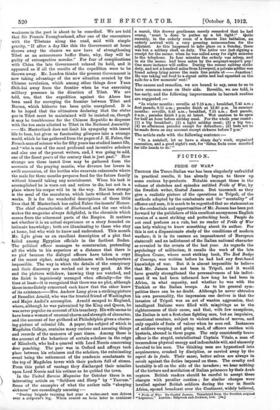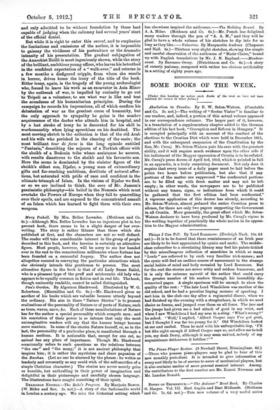FICTION.
PRIDE OF WAR.* THOUGH the Turco-Italian war has been singularly unfruitful in practical results, it has already begun to throw up some curious by-products. Notable amongst these is the volume of sketches and episodes entitled Pride of War, by the Swedish writer, Gustaf Janson. But inasmuch as they give a realistic picture of the operations in Tripoli, of the methods adopted by the combatants and the "mentality" of officers and men, it is much to be regretted that no statement as to the credentials and opportunities of Mr. Janson has been put forward by the publishers of this excellent anonymous English version of a most striking and perturbing book. People do not read prefaces as a rule, but no reader of Pride of War can help wishing to know something about its author. For this is not a dispassionate study of the conditions of modern warfare ; it is in its essence an impesehment of European statecraft and an indictment of the Italian national character as revealed in the events of the last year. As regards the psychology of militarism, it recalls the work of the late Stephen Crane, whose most striking book, The Red Badge of Courage, was written before he had had any first-band knowledge of war. Bat it is almost impossible to believe that Mr. Janson has not been in Tripoli, and it would have greatly strengthened the persuasiveness of his indict- ment if we had been informed how long be had been in Africa, in what capacity, and whether he was with the Turkish or the Italian troops. As to his general sym- pathies there can be no doubt. Although be never obtrudes his own personality, the impression one derives is that the invasion of Tripoli was an act of wanton aggression, that intelligent Italians were filled with misgivings as to the righteousness of their cause, and that, with few exceptions, the Italian is not a first-class fighting man, but an impulsive, emotional creature, subject to violent attacks of nerves, and only capable of feats of valour when he sees red. Instances of soldiers weeping and going mad, of officers smitten with hysteria, abound in these pages. The only consistently brave officer is the stupid, unintellectnal Captain Vitale, a man of tremendous physical energy and indomitable will, and sincerely devoted to his men. The thinking men are hypnotized into acquiescence, crushed by discipline, or carried away by the esprit de la foule. Their saner, better selves are always in revolt against the duties imposed on them. The cruelty and brutality is all on the side of the invaders ; we hear nothing of the torture and mutilation of Italian prisoners by their Arab captors. British readers should be careful to accept these charges with peculiar caution ; for similar charges were levelled against British soldiers during the war in South Africa, spread broadcast over the Continent, widely believed, • Pride of War. By Gustaf Janson. Translated from the Swedish original "Lagnerna." London: Sidgwick and Jackson, Ltd. Ens.]
and only admitted to be without foundation by those best capable of judging when the calumny had several years' start of the official denial.
But while it is right to enter this caveat, and to emphasize the limitations and omissions of the author, it is impossible to gainsay the vividness of his portraiture or the dramatic intensity of his presentation. The gradual subjugation of the Anarchist Zirilli is most ingeniously shown, while the story of the brilliant, ambitious young officer, who leaves his betrothed in the confident expectation of a " walk-over," and returns in a few months a disfigured cripple, from whom she recoils in horror, drives home the irony of the title of the book. Bitter irony, again, is the tragedy of the young archmologist who, forced to leave his work as an excavator in Asia Minor by the outbreak of war, is impelled by curiosity to go out to Tripoli as a volunteer, to see what war is like and test the soundness of his humanitarian principles. During the campaign he records his impressions, all of which confirm his detestation of war as the greatest curse of humanity, but the only approach to sympathy he gains is the sombre acquiescence of the doctor who attends him in hospital, and by a last stroke of irony he is decorated for his skill in marksmanship when lying speechless on his deathbed. The most moving sketch in the collection is that of the old Arab and his wife who perished in the clearing of the oasis ; the most brilliant tour de force is the long episode entitled "Fantasia," describing the sojourn of a Turkish officer with the sheikh of a Bedouin tribe whose assistance he secures, with results disastrous to the sheikh and his favourite son. Here the scene is dominated by the sinister figure of the sheikh's eldest son, Djafar, a young man of extraordinary gifts and far-reaching ambitions, destitute of natural affec- tions, but saturated with pride of race and confident in the ultimate triumph of Islam. In the visions of Djafar we find, or so we are inclined to think, the core of Mr. Janson's pessimistic philosophy—his belief in the Nemesis which must overtake the Powers of Europe when they fall to quarrelling over their spoils, and are exposed to the concentrated assault of an Islam which has learned to fight them with their own weapons.



































































 Previous page
Previous page